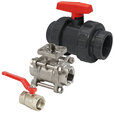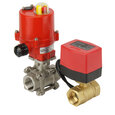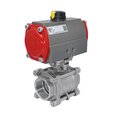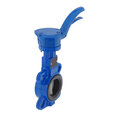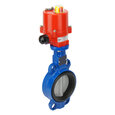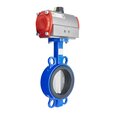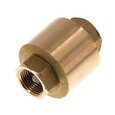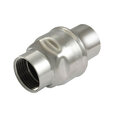NSF Valve Certifications: NSF 61 vs NSF 372
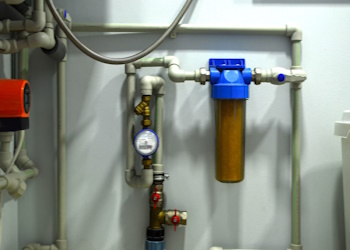
Figure 1: NSF-certified components for a water filter system
NSF valve certification is a process by which valves are tested and evaluated to ensure that they meet the standards set by the National Sanitation Foundation (NSF). This certification is important because it helps ensure that valves are safe for use in applications that may come into contact with potable water or food. A few examples include:
- Water systems and products
- Commercial food service products
- Food and beverage products with label verification
View our online selection of valves!
NSF certification significance
An NSF-certified product ensures that the company manufacturing it adheres to the rigorous standards set and enforced by the NSF. The certification process contains extensive product testing, material analysis, surprise plant inspections, and relevant assessments to ensure a product agrees with NSF's safety requirements. For example:
- Food safety: NSF-certified equipment and materials prevent foodborne illnesses.
- Drinking water quality: NSF-certified components ensure safe drinking water.
- Clean indoor air: NSF-certified HVAC systems enhance indoor air quality.
- Reduced chemical exposure: NSF-certified consumer products lower exposure to harmful chemicals.
There are mainly two NSF certifications for valve systems: NSF 61 and NSF 372.
NSF 61
NSF 61 certification ensures that the product has been tested and evaluated by an independent laboratory to ensure that it meets the health effects requirements of the National Sanitation Foundation for drinking water systems. NSF 61-certified valves are safe for use in applications where they may come into contact with potable water. However, it does not establish performance, taste, odor, or microbial support requirements.
Here are some examples of products that are typically NSF/ANSI 61 certified:
- Pipes and fittings
- Valves and pumps
- Water meters and filters
- Water treatment chemicals
- Faucets and drinking fountains
- Water storage tanks and reservoirs
- Piping and plumbing systems
- Protective barrier materials (types of cement, paints, and other coatings)
NSF 372
NSF/ANSI/CAN 372 is a joint standard developed by NSF International, the American National Standards Institute (ANSI), and the Canadian Standards Association (CSA). Products and materials certified to NSF/ANSI/CAN 372 have been tested and evaluated to ensure they contain no more than 0.25% lead. Products and materials covered by NSF 372 include:
- Valves
- Water softeners
- Faucets
- Coatings
- Ultraviolet reactors
- Gaskets
- Water meters
- Reverse osmosis systems
- Water filters
- Pipes
- Solder and flux fittings
NSF certification for valves
Valves and fittings utilized in drinking water systems must have NSF 61 and/or NSF 372 certification to ensure suitability. NSF certification applies to various valves, including ball, butterfly, gate, globe, and check valves. NSF-certified valves are used in various applications, including municipal water systems, private wells, food processing plants, and beverage manufacturing facilities. NSF certification is valid for five years, after which the valve manufacturer must submit the valve for re-testing and evaluation to maintain NSF certification.
Getting valves NSF-certified
Organizations must follow a seven-step process to get their valves NSF certified:
- Application and information submission: The organization must apply to the NSF and provide information about the valves they want to certify. This information includes the product name, model number, materials, and intended use.
- Product evaluation: The NSF evaluates the product information to determine if the valves meet the requirements for NSF certification. They may also request additional information or samples from the organization.
- Product testing: The NSF tests the valves in a laboratory to ensure they meet NSF's standards for safety and performance. This testing may include various tests, such as material composition, pressure, and flow tests.
- Manufacturing facility inspection: The NSF inspects the organization's manufacturing facility to ensure that the valves are produced following NSF's standards. They may also collect samples of valves from the production line for testing.
- Test results review and acceptance: The NSF reviews the results of all testing and inspections to determine if the valves meet NSF's certification requirements. If the valves meet all requirements, the NSF will issue a certificate of authorization.
- Contract signed and products listed: The organization must sign a contract with NSF to agree to the terms of certification. The NSF will then list the certified valves in its online database.
- Annual plant inspection and retesting: The NSF inspects the organization's manufacturing facility and retests the certified valves annually to ensure they continue meeting NSF's standards.
FAQs
What is the significance of NSF 61 valve certification?
NSF 61 valve certification ensures drinking water system components meet safety standards.
What is the purpose of NSF 372 valve certification?
NSF 372 valve certification focuses on lead-free requirements for drinking water systems.
Is NSF 372 the same as NSF 61?
No, NSF 61 focuses on safety and performance requirements for drinking water system components, while NSF 372 specifically addresses lead-free needs for these components.
What does NSF 61 check valve certification guarantee?
NSF 61 check valve certification ensures that check valves meet drinking water system safety requirements.




